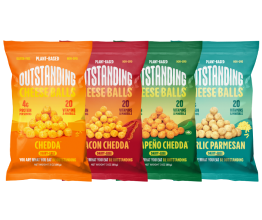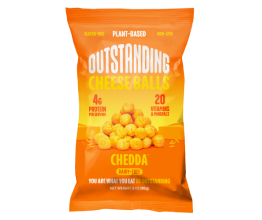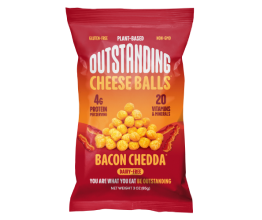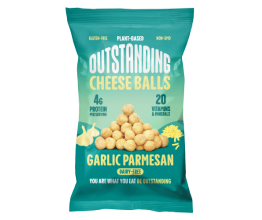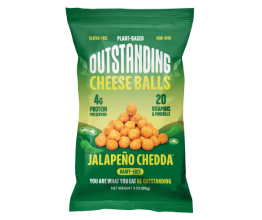How Do Nutritional Needs Change Over Time?
Look, you can’t stay a teenager forever, and why would you want to? Yes, teens can pretty much eat whatever they want and not ever feel the effects of junk food, but they are also going through a stressful time in life. Remember high school? Yikes.
Getting older can be a drag, or you can welcome your changing body with open arms and get on board with good nutrition so that you can have the energy and health to do whatever you want! It’s all in the attitude.
Today, we will explain why your nutritional needs change as you get older and give you some suggestions on how to improve your diet with healthy and nutritious foods. We will also give you the inside scoop on all the healthy and delicious snack foods from Outstanding Foods because they are, well, outstanding!
Why Do Nutritional Needs Change As We Age?
As we age, our appearance isn’t the only thing that changes. Our bodies also begin to change on the inside. We begin to lose muscle, our skin begins to thin, and our stomach acid gradually decreases. This change in stomach acid eventually affects the way we digest food and absorb nutrients like vitamin B12, iron, calcium, and magnesium. The dilemma is, our body still needs these nutrients—possibly more than ever.
Another food-related challenge that begins as we age is our bodies become less sensitive to recognizing signs of thirst and hunger. While your body may need to eat or drink, your brain may not notice for a while leading to skipped meals and dehydration.
Plus, our bodies need fewer calories as we age but the same amount of nutrients. This is why older people may need to make healthier choices. When you’re not eating much, it is important that the foods you are eating are giving you the nutrition you need.
The Downside Of The Change
The changes that come with aging aren’t all bad, but there are a few less pleasant side effects. For example, as you get older, you are more prone to dehydration, and your appetite will slowly dwindle. But don’t worry, there are also lots of great things about getting older. It is just important that you know about the negatives so that you can address them as they come up.
Your More Prone To Dehydration
The human body is made up of roughly 60% water, but we are constantly losing water through sweat and urine. At any age, it is important to stay hydrated by drinking lots of water. When you’re young, your body typically knows when it needs more water and then sends a signal to your brain to make you thirsty so that you grab a glass of water.
However, as we age, the receptors that sense dehydration becomes less sensitive. Sometimes your body will need water but won’t send a signal to create thirst, so it is up to you to remember on your own. And we all know that remembering things isn’t exactly the strong suit of an aging brain.
The kidneys are responsible for helping your body conserve water, but our kidney function naturally decreases as we age. This is just another reason why your body has trouble staying hydrated as you age. If you stay dehydrated for too long, it can lead to a long list of health complications.
The solution to age-induced dehydration is rather simple; you need to drink more water. Try drinking a glass when you wake up and then one to two with every meal. This will help you avoid prolonged dehydration.
You May Lose Your Appetite
Another negative side effect of aging is a decrease in appetite. This is because older people have lower levels of hunger hormones and higher levels of fullness hormones. If you don’t carefully monitor your nutritional intake, you could easily find yourself suffering the side effects of malnutrition, such as weight loss, nutritional deficiencies, and generally poor health.
If you are worried that you may have a lower appetite, then try eating smaller meals more frequently instead of eating three large meals a day. This will help you get the nutrition you need without making you feel too full at once. Just make sure to add lots of healthy snacks to your diet.
More, More, More
As you age, your body needs more. More nutrients, more protein, more fiber, more calcium, and more vitamin D. More, more, more! Here’s why:
You Need More Nutrients
Yes, as you age, your body needs fewer calories, but it also needs more nutrition. It is quite the catch 22. If you eat the same amount of calories that you did as a teenager, you will likely gain weight, but you still need the same amount or greater of some nutrients. This is why it is essential that older people eat well-balanced diets.
If you don’t eat a wide enough variety of whole foods, you could end up missing out on some essential nutrients. So change up your fruits and veggies frequently and eat a variety of protein types to keep your nutrients up and your calories down.
You Need More Protein
One of the side effects of aging is the loss of muscle and strength. To combat this, you should make sure that your diet is rich in protein. There are tons of delicious protein-packed foods to eat. Figure out your favorites and enjoy them regularly to prevent a loss in strength.
You Need More Fiber
Constipation is common amongst older adults, but you can easily combat this by eating a fiber-filled diet. This will help you avoid bowel-related issues such as constipation and diverticular disease. Try out some of these fiber-filled foods!
You Need More Calcium And Vitamin D
As we age, our bones get weaker because our body doesn’t absorb calcium as well as it used to. The reason that you absorb less calcium is likely linked to a vitamin D deficiency. So you will need to supplement your diet with both to keep your bones strong and healthy. But that doesn’t mean you have to down milk. There are plenty of calcium-rich foods to try out.
You Need More Vitamin B12
Older people have a harder time absorbing vitamin B12, which is essential for healthy brain function and energy. If you are a vegan or vegetarian, you may lack the B12 you need simply because B12 is more abundant in animal foods. Either way, you may want to seek out B12 rich foods or consider taking a B12 supplement. However, you should always consult your doctor before you begin taking any supplement.
You Need More Of Other Things Too
As you age, you also need more potassium, omega-3 fatty acids, magnesium, and iron. These nutrients are especially key for people who follow a plant-based diet.
Snacking At Its Best
Just because you need to eat healthier as an older person to get the nutrients you need doesn’t mean you can’t enjoy snacks. You just need to pick snacks that are packed with nutrients as well as flavor. That’s why we have created a bunch of delicious plant-based snacks that have the goods you need and the flavors you crave.
Take Out Meal In A Bag Puffs
Try out Outstanding Puffs. These tasty puffs come in four delicious flavors, including Pizza Partay, White Chedda, Hella Hot, and Chill Ranch. The best part is each bag is packed with 21grams of protein and 30% of the daily vitamins you need.
These tasty puffs are a great source of calcium, iron, vitamin B12, and D. They are also non-GMO, gluten-free, kosher, soy-free, and have zero trans fats. With these tasty chips, you can eat the whole bag and not feel an ounce of shame. They are a great addition to a healthy, well-balanced diet!
Looking Back
Getting older is a completely natural part of life, but it doesn’t have to be a drag. With delicious snack foods like Outstanding Puffs, you can have your treats and get the nutrition your body needs at the same time.
If you want to try more delicious and nutritious snack foods, then check out our Pig Out Pigless Pork Rinds for a crispy snack that packs the protein and flavors you want. Eat your way to better health by making smart nutritional choices that taste good and make you feel great!
Sources:
As You Get Older, You Need to Drink More Water | Healthline
